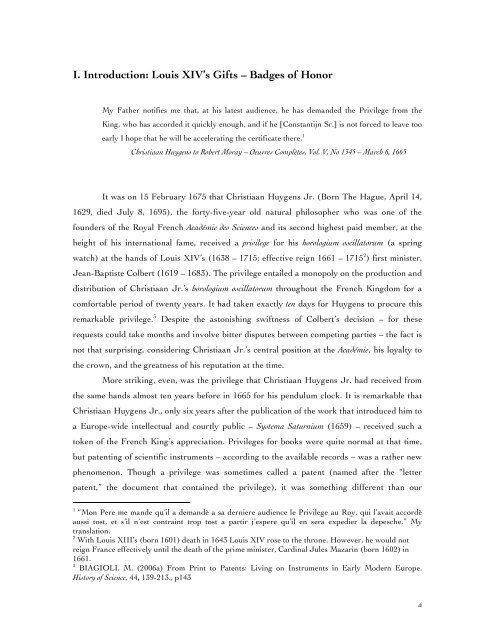Christiaan Huygens – A family affair - Proeven van Vroeger
Christiaan Huygens – A family affair - Proeven van Vroeger
Christiaan Huygens – A family affair - Proeven van Vroeger
You also want an ePaper? Increase the reach of your titles
YUMPU automatically turns print PDFs into web optimized ePapers that Google loves.
I. Introduction: Louis XIV’s Gifts <strong>–</strong> Badges of Honor<br />
My Father notifies me that, at his latest audience, he has demanded the Privilege from the<br />
King, who has accorded it quickly enough, and if he [Constantijn Sr.] is not forced to leave too<br />
early I hope that he will be accelerating the certificate there. 1<br />
<strong>Christiaan</strong> <strong>Huygens</strong> to Robert Moray <strong>–</strong> Oeuvres Complètes, Vol. V, No 1345 <strong>–</strong> March 6, 1665<br />
It was on 15 February 1675 that <strong>Christiaan</strong> <strong>Huygens</strong> Jr. (Born The Hague, April 14,<br />
1629, died July 8, 1695), the forty-five-year old natural philosopher who was one of the<br />
founders of the Royal French Académie des Sciences and its second highest paid member, at the<br />
height of his international fame, received a privilege for his horologium oscillatorum (a spring<br />
watch) at the hands of Louis XIV’s (1638 <strong>–</strong> 1715; effective reign 1661 <strong>–</strong> 1715 2 ) first minister,<br />
Jean-Baptiste Colbert (1619 <strong>–</strong> 1683). The privilege entailed a monopoly on the production and<br />
distribution of <strong>Christiaan</strong> Jr.’s horologium oscillatorum throughout the French Kingdom for a<br />
comfortable period of twenty years. It had taken exactly ten days for <strong>Huygens</strong> to procure this<br />
remarkable privilege. 3 Despite the astonishing swiftness of Colbert’s decision <strong>–</strong> for these<br />
requests could take months and involve bitter disputes between competing parties <strong>–</strong> the fact is<br />
not that surprising, considering <strong>Christiaan</strong> Jr.’s central position at the Académie, his loyalty to<br />
the crown, and the greatness of his reputation at the time.<br />
More striking, even, was the privilege that <strong>Christiaan</strong> <strong>Huygens</strong> Jr. had received from<br />
the same hands almost ten years before in 1665 for his pendulum clock. It is remarkable that<br />
<strong>Christiaan</strong> <strong>Huygens</strong> Jr., only six years after the publication of the work that introduced him to<br />
a Europe-wide intellectual and courtly public <strong>–</strong> Systema Saturnium (1659) <strong>–</strong> received such a<br />
token of the French King’s appreciation. Privileges for books were quite normal at that time,<br />
but patenting of scientific instruments <strong>–</strong> according to the available records <strong>–</strong> was a rather new<br />
phenomenon. Though a privilege was sometimes called a patent (named after the “letter<br />
patent,” the document that contained the privilege), it was something different than our<br />
1 “Mon Pere me mande qu’il a demandè a sa derniere audience le Privilege au Roy, qui l’avait accordè<br />
aussi tost, et s’il n’est contraint trop tost a partir j’espere qu’il en sera expedier la depesche.” My<br />
translation.<br />
2 With Louis XIII’s (born 1601) death in 1643 Louis XIV rose to the throne. However, he would not<br />
reign France effectively until the death of the prime minister, Cardinal Jules Mazarin (born 1602) in<br />
1661.<br />
3 BIAGIOLI, M. (2006a) From Print to Patents: Living on Instruments in Early Modern Europe.<br />
History of Science, 44, 139-213., p143<br />
4


